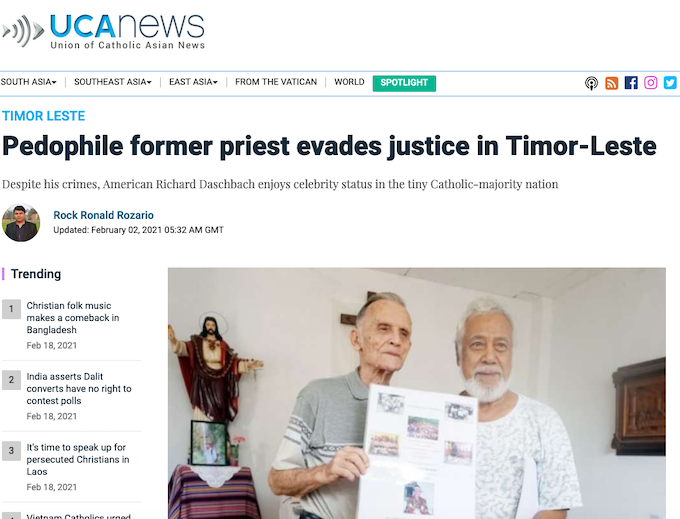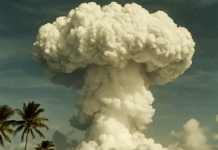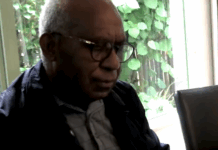
By António Sampaio in Pante Macassar, Timor-Leste
The fear that has led for years to silence dozens of children, allegedly victims of sexual abuse by a former priest who begins trial today in Timor-Leste’s western enclave, still shrouds the case.
Witnesses, victims and others who knew about the abuse – including people involved in the process – prefer not to speak, pointing in some cases to the feeling of deference to the figure of the accused American Richard Daschbach, 84.
Even after being expelled from the priesthood and officially condemned by the Vatican, Daschbach continues to be venerated by many who call him “master” and who minimise or ignore the crimes he is accused of.
Instead, they highlight his humanitarian action and even the support he gave during the Indonesian occupation, in some cases, mixing truths with myths.
When he recently turned 84, for example, some of his supporters posted a photo of him in traditional Timorese clothing on Facebook.
The publication had hundreds of congratulatory votes and even a “tag” on the page of one of its alleged victims.
Even if the rumours circulated, the matter was rarely more than half conversations or references in secret, a situation that would have continued if one of the victims had not brought her abuse report to the congregation.
Punished by the Vatican
Richard Daschbach, detained in 2019, who has already been punished by the Vatican, is accused of abusing at least two dozen children at the orphanage where he worked, Topu Honis, located in Oecusse.
The prosecutor also charges Daschbach with the crimes of child pornography and domestic violence.
Unprecedented in Timor-Leste, as it involved a former church member, the case has sparked controversy and intense debate.
Current and past sources in the Timorese judicial sector, heard by Lusa, highlight the importance of the process, admitting that the outcome, whatever it may be, can have a significant impact, silencing or giving confidence to other victims.
Part of the debates focuses on the public perception that Daschbach has had support from some individuals in Timor-Leste, namely two former Presidents of the Republic, Xanana Gusmão and Taur Matan Ruak, the latter current prime minister.
Judicial sources indicated to Lusa that Xanana Gusmão was even listed as a defence witness, among a range of people, most of whom were linked to the orphanage where the crimes were committed.
In 2018, for example, after confessing his crimes to the congregation – the Vatican was beginning the process that would end in his expulsion from the priesthood -, Daschbach was visited by Taur Matan Ruak and his wife, Isabel Ferreira, at headquarters SVD in Dili.
Ex-priest’s return to Oecusse
A visit in which, explained Yohanes Suban Gapun, SVD regional supervisor, Taur Matan Ruak had asked them to let the ex-priest return to Oecusse.
“Mr Taur Matan Ruak and his wife came to visit us and spoke to Daschbach. I was also asked if I would please let him return to Oecusse because many people like him there and still respect him a lot. Please let him go to Oecusse too because he is old and let him die there in peace,” he said.
Asked by Lusa in 2019 about the reason for this visit, Taur Matan Ruak said he did it out of respect.
“I had no intention of passing the priest an immunity card. Just as a human being, out of respect, we visited to find out what was going on and to express our concern about the issues,” he said.
Even more evident has been the support given by former President Xanana Gusmão, which began to be publicly noticed in October last year when Juu’s, which represents the victims, introduced a precautionary measure against the Archdiocese of Dili, to stop the publication of a controversial report on the case prepared by the then head of the Justice and Peace Commission.
Xanana Gusmão, who was outside the Dili Court with an organised demonstration in support of the diocese, was listed as a witness because a copy of the report had been given to him and because he later sent a copy to Juu’s.
In his testimony, the Timorese leader ended up deviating several times from the audience’s purpose, questioning the fact that there were accusations against the former priest only recently, despite the fact that he had been in Timor-Leste for a long time.
Justice ‘has to be fair’
“There has to be justice, but justice has to be fair, obey procedures, criteria that dignify justice itself. I realised that there was something in this case that was not in accordance with the rules of investigation”, he told Lusa at the time.
More controversial was the recent visit that Xanana Gusmão made to the house in Dili where Daschbach was under house arrest, at the time of the defendant’s birthday, and about which he informed some East Timorese press, later distributing a statement that was practically published in full in several newspapers .
The visit led the ex-president’s three children to write letters to the alleged victims, regretting that their father visited Daschbach.
The news coverage of this visit drew criticism from the president of the Timorese Press Council, Virgílio Guterres, who considered that the news in the national press tried to “whiten” the former American priest.
Xanana Gusmão has so far not reacted to the controversy, but on Thursday he traveled with an entourage to accompany Daschbach on the ferry that took him from Dili to Oecusse.
Mateus Assunção Mendes, chief superintendent and commander of the National Police of Timor-Leste (PNTL), confirmed to Lusa that Xanana Gusmão, Daschbach and the rest of the delegation are staying at the same hotel in Pante Macassar, capital of the enclave.
“Yes, they are in the same place,” he confirmed.
Lusa tried several times to talk to Xanana Gusmão, without success.
Little Timorese media attention
Another factor that has conditioned the environment around the case has been the reduced attention of almost all Timorese media, which, in some situations, has even been accused by the Press Council of trying to “whiten” Daschbach.
Exceptions are the publication Tempo Timor, the first to report the case of the former priest and who has already presented testimonies of victims and details of the case, and Néon Metin, which has also written about the case, including recently publishing testimonies of victims.
José Belo, the journalist for Tempo Timor who, with journalist Tjistske Lingsma, first reported the case, tells Lusa that it has been difficult to convince people to talk about the case.
“It is very difficult to convince people to speak. When planning interviews, everyone prefers to remain silent. Some people look at this man as a god,” he told Lusa.
The trial, which takes place behind closed doors, begins today at the Oecusse Court in Pante Macassar.
PNTL plans to install a security perimeter around the building.
This article has been translated by an Asia Pacific Report correspondent and is published with permission.











































